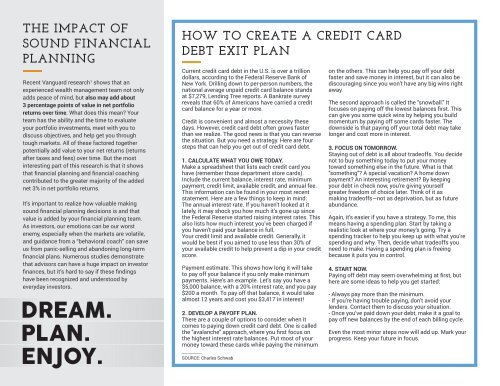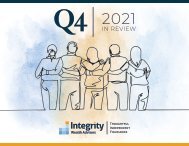You also want an ePaper? Increase the reach of your titles
YUMPU automatically turns print PDFs into web optimized ePapers that Google loves.
THE IMPACT OF<br />
SOUND FINANCIAL<br />
PLANNING<br />
Recent Vanguard research 1 shows that an<br />
experienced wealth management team not only<br />
adds peace of mind, but also may add about<br />
3 percentage points of value in net portfolio<br />
returns over time. What does this mean? Your<br />
team has the ability and the time to evaluate<br />
your portfolio investments, meet with you to<br />
discuss objectives, and help get you through<br />
tough markets. All of these factored together<br />
potentially add value to your net returns (returns<br />
after taxes and fees) over time. But the most<br />
interesting part of this research is that it shows<br />
that financial planning and financial coaching<br />
contributed to the greater majority of the added<br />
net 3% in net portfolio returns.<br />
It’s important to realize how valuable making<br />
sound financial planning decisions is and that<br />
value is added by your financial planning team.<br />
As investors, our emotions can be our worst<br />
enemy, especially when the markets are volatile,<br />
and guidance from a “behavioral coach” can save<br />
us from panic-selling and abandoning long-term<br />
financial plans. Numerous studies demonstrate<br />
that advisors can have a huge impact on investor<br />
finances, but it’s hard to say if these findings<br />
have been recognized and understood by<br />
everyday investors.<br />
DREAM.<br />
PLAN.<br />
ENJOY.<br />
HOW TO CREATE A CREDIT CARD<br />
DEBT EXIT PLAN<br />
Current credit card debt in the U.S. is over a trillion<br />
dollars, according to the Federal Reserve Bank of<br />
New York. Drilling down to per-person numbers, the<br />
national average unpaid credit card balance stands<br />
at $7,279, Lending Tree reports. A Bankrate survey<br />
reveals that 60% of Americans have carried a credit<br />
card balance for a year or more.<br />
Credit is convenient and almost a necessity these<br />
days. However, credit card debt often grows faster<br />
than we realize. The good news is that you can reverse<br />
the situation. But you need a strategy. Here are four<br />
steps that can help you get out of credit card debt.<br />
1. CALCULATE WHAT YOU OWE TODAY.<br />
Make a spreadsheet that lists each credit card you<br />
have (remember those department store cards).<br />
<strong>In</strong>clude the current balance, interest rate, minimum<br />
payment, credit limit, available credit, and annual fee.<br />
This information can be found in your most recent<br />
statement. Here are a few things to keep in mind:<br />
The annual interest rate. If you haven't looked at it<br />
lately, it may shock you how much it's gone up since<br />
the Federal Reserve started raising interest rates. This<br />
also lists how much interest you've been charged if<br />
you haven't paid your balance in full.<br />
Your credit limit and available credit. Generally, it<br />
would be best if you aimed to use less than 30% of<br />
your available credit to help prevent a dip in your credit<br />
score.<br />
Payment estimate. This shows how long it will take<br />
to pay off your balance if you only make minimum<br />
payments. Here's an example. Let's say you have a<br />
$5,000 balance, with a 20% interest rate, and you pay<br />
$200 a month. To pay off that balance, it would take<br />
almost 12 years and cost you $3,417 in interest!<br />
2. DEVELOP A PAYOFF PLAN.<br />
There are a couple of options to consider when it<br />
comes to paying down credit card debt. One is called<br />
the "avalanche" approach, where you first focus on<br />
the highest interest rate balances. Put most of your<br />
money toward these cards while paying the minimum<br />
SOURCE: Charles Schwab<br />
on the others. This can help you pay off your debt<br />
faster and save money in interest, but it can also be<br />
discouraging since you won't have any big wins right<br />
away.<br />
The second approach is called the "snowball." It<br />
focuses on paying off the lowest balances first. This<br />
can give you some quick wins by helping you build<br />
momentum by paying off some cards faster. The<br />
downside is that paying off your total debt may take<br />
longer and cost more in interest.<br />
3. FOCUS ON TOMORROW.<br />
Staying out of debt is all about tradeoffs. You decide<br />
not to buy something today to put your money<br />
toward something else in the future. What is that<br />
"something"? A special vacation? A home down<br />
payment? An interesting retirement? By keeping<br />
your debt in check now, you're giving yourself<br />
greater freedom of choice later. Think of it as<br />
making tradeoffs—not as deprivation, but as future<br />
abundance.<br />
Again, it's easier if you have a strategy. To me, this<br />
means having a spending plan. Start by taking a<br />
realistic look at where your money's going. Try a<br />
spending tracker to help you keep up with what you're<br />
spending and why. Then, decide what tradeoffs you<br />
need to make. Having a spending plan is freeing<br />
because it puts you in control.<br />
4. START NOW.<br />
Paying off debt may seem overwhelming at first, but<br />
here are some ideas to help you get started:<br />
- Always pay more than the minimum.<br />
- If you're having trouble paying, don't avoid your<br />
lenders. Contact them to discuss your situation.<br />
- Once you've paid down your debt, make it a goal to<br />
pay off new balances by the end of each billing cycle.<br />
Even the most minor steps now will add up. Mark your<br />
progress. Keep your future in focus.















